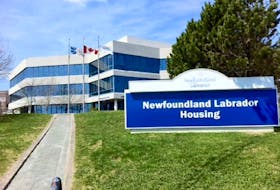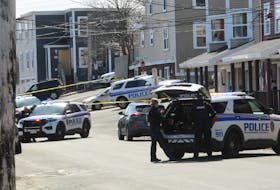Dan Meades, co-ordinator of Transition House Association of Newfoundland and Labrador, said there’s a lot to be concerned about in the budget, especially for those making $20,000 to $22,000 a year.
The new Income Supplement will give someone with that income $450 annually, which is about two per cent of what a person making minimum wage makes in a year. Meades said that sort of cancels out the two per cent HST hike, but those residents, despite their low incomes, are still facing the same taxes and fees as everybody else, including the new debt-reduction levy. It doesn’t add up to him: someone making $25,000 will pay $300 for that fee (1.2 per cent of their income), while someone making $200,000 will pay $900 (0.45 of their income).
Related stories:
From free to fee: Taxes, fees going up in 2016 budget
Pam Frampton: Champagne tastes, beer budget
Cab drivers hard hit by budget
Budget not inspiring for the Newfoundland arts sector
“This type of regressive taxation hits people living in poverty the hardest, and it’s those individuals that are not living on income support, they’re working and working for minimum wage, and their only benefit in this budget is $450 a year — and that doesn’t come anywhere near what they’re going to be paying in taxes and fees.”
People with low incomes are also subject to increased fees for everything from a birth certificate (up to $35 from $20) to vehicle registration (up to $180 from $160). Add the doubled gas tax (starting June 2), and a 15 per cent tax on insurance, and driving becomes a lot less accessible for some people.
What’s being lost
Along with the new taxes and fees comes the news that benefits and rebates that previously offered a little financial relief are being chopped or restricted. Take the Home Heating Rebate Program, for example, which allowed households with a family income of $40,000 a rebate of up to $250 a year (or up to $500 in Coastal Labrador). That’s axed.
New parents will lose the one-time $1,000 baby bonus as well as a $100 monthly payment for the first 12 months after a birth or adoption.
People with low incomes are also losing access to health support. Axing the Adult Dental Program for clients using the Access and 65+ programs will save the province $3 million; the government expects to save around $5 million or so a year by no longer paying for over-the-counter drugs for residents who use the Provincial Drug Program.
“It’s $5 million in over-the-counter drugs individuals living below the poverty line won’t be able to access. That includes things like diabetes test strips. Blood sugar test strips — this is huge stuff. As well as the adult dental programs. Now people living in poverty no longer have a way to access dentistry work. We know that dental care correlates to the rest of your health, including cardiac health,” Meades said.
Potential outcomes
So how are people who were already struggling going to cope?
“We’re going to see an increase in negative social outcomes. There’s just no way around it,” Meades said.
“When people are in drastic situations, they make drastic choices. I can guarantee you that there are going to be people that are going to be driving without insurance. More now because they can’t afford insurance,” he said.
“You can’t blame people for making those decisions. You can’t blame an individual who’s trying to get back and forth to work at a $10.50 an hour job for doing whatever they need to do to get back and forth to that gig.”
Meades said while he’s glad the government is still funding the Poverty Reduction Strategy, he believes this budget is going to force more people into poverty.
“They’ve said unemployment is going to go up, and it’s partly because of the measures in this budget. As we see those types of things happen, we have more people on income support. Those individuals are inherently living in poverty because of our income support rates. We’re going to see an increased need. We’re going to see rates of domestic violence increase. We’re going to see crime rates increase — all the negative factors that go along with increased poverty rates, not to mention increased cost to our health-care system. We know the more people living in poverty, the more we have to spend on health, the more we have to spend on health and justice and the tougher our education outcomes are. It’s a tough one long-term.”
Gerry Rogers, NDP MHA for St. John’s Centre, also expressed concern about how people living in poverty will be affected by the budget measures.
“What I find very interesting is that the people who benefited least from our prosperity are the ones who carry the greatest burden due to the current fiscal situation,” she said. “And we haven’t yet seen the full effect of the rollouts.”
She called the deficit reduction levy a “Muskrat Falls tax,” and said people will essentially be paying for the Muskrat Falls project so that down the road they can pay double for electricity.
“The thing that I find the most difficult to accept is that this government was working as accountants, not as a government. They haven’t created a single job; they haven’t created any kind of diversity. There’s nothing that they have done that brings us forward. It’s like a car that’s stuck in the mud and they’re spinning their wheels. They’re not getting that car out of the mud. They’re just digging us in deeper and deeper. And to think that the budget, rather than stimulating the economy, is choking the life out of our own people, that’s not progress.”
Non-profit sector
Meades noted that the province lived up to its commitment of keeping the $70-million community grants program, which helps non-profit organizations, intact.
“That still happens, so our non-profit sector is still strong in Newfoundland and Labrador. It’s hard, because the demand for the services provided by the non-profit sector are now going up, and there’s obviously no appetite for increased money to provide those services, but we haven’t seen cuts, which was a concern there,” he said.
But there is still concern that the supplemental budget, to be revealed in the fall, will affect funding for non-profits, and that they’ll be expected to work harder with fewer resources.
“I’m concerned that some of the organizations in the province that do really, really important work won’t be around to do that work this time next year,” said Meades.
More from this reporter:
Five N.L. schools to close in June
No commitment from province on youth homelessness plan
Dan Meades, co-ordinator of Transition House Association of Newfoundland and Labrador, said there’s a lot to be concerned about in the budget, especially for those making $20,000 to $22,000 a year.
The new Income Supplement will give someone with that income $450 annually, which is about two per cent of what a person making minimum wage makes in a year. Meades said that sort of cancels out the two per cent HST hike, but those residents, despite their low incomes, are still facing the same taxes and fees as everybody else, including the new debt-reduction levy. It doesn’t add up to him: someone making $25,000 will pay $300 for that fee (1.2 per cent of their income), while someone making $200,000 will pay $900 (0.45 of their income).
Related stories:
From free to fee: Taxes, fees going up in 2016 budget
Pam Frampton: Champagne tastes, beer budget
Cab drivers hard hit by budget
Budget not inspiring for the Newfoundland arts sector
“This type of regressive taxation hits people living in poverty the hardest, and it’s those individuals that are not living on income support, they’re working and working for minimum wage, and their only benefit in this budget is $450 a year — and that doesn’t come anywhere near what they’re going to be paying in taxes and fees.”
People with low incomes are also subject to increased fees for everything from a birth certificate (up to $35 from $20) to vehicle registration (up to $180 from $160). Add the doubled gas tax (starting June 2), and a 15 per cent tax on insurance, and driving becomes a lot less accessible for some people.
What’s being lost
Along with the new taxes and fees comes the news that benefits and rebates that previously offered a little financial relief are being chopped or restricted. Take the Home Heating Rebate Program, for example, which allowed households with a family income of $40,000 a rebate of up to $250 a year (or up to $500 in Coastal Labrador). That’s axed.
New parents will lose the one-time $1,000 baby bonus as well as a $100 monthly payment for the first 12 months after a birth or adoption.
People with low incomes are also losing access to health support. Axing the Adult Dental Program for clients using the Access and 65+ programs will save the province $3 million; the government expects to save around $5 million or so a year by no longer paying for over-the-counter drugs for residents who use the Provincial Drug Program.
“It’s $5 million in over-the-counter drugs individuals living below the poverty line won’t be able to access. That includes things like diabetes test strips. Blood sugar test strips — this is huge stuff. As well as the adult dental programs. Now people living in poverty no longer have a way to access dentistry work. We know that dental care correlates to the rest of your health, including cardiac health,” Meades said.
Potential outcomes
So how are people who were already struggling going to cope?
“We’re going to see an increase in negative social outcomes. There’s just no way around it,” Meades said.
“When people are in drastic situations, they make drastic choices. I can guarantee you that there are going to be people that are going to be driving without insurance. More now because they can’t afford insurance,” he said.
“You can’t blame people for making those decisions. You can’t blame an individual who’s trying to get back and forth to work at a $10.50 an hour job for doing whatever they need to do to get back and forth to that gig.”
Meades said while he’s glad the government is still funding the Poverty Reduction Strategy, he believes this budget is going to force more people into poverty.
“They’ve said unemployment is going to go up, and it’s partly because of the measures in this budget. As we see those types of things happen, we have more people on income support. Those individuals are inherently living in poverty because of our income support rates. We’re going to see an increased need. We’re going to see rates of domestic violence increase. We’re going to see crime rates increase — all the negative factors that go along with increased poverty rates, not to mention increased cost to our health-care system. We know the more people living in poverty, the more we have to spend on health, the more we have to spend on health and justice and the tougher our education outcomes are. It’s a tough one long-term.”
Gerry Rogers, NDP MHA for St. John’s Centre, also expressed concern about how people living in poverty will be affected by the budget measures.
“What I find very interesting is that the people who benefited least from our prosperity are the ones who carry the greatest burden due to the current fiscal situation,” she said. “And we haven’t yet seen the full effect of the rollouts.”
She called the deficit reduction levy a “Muskrat Falls tax,” and said people will essentially be paying for the Muskrat Falls project so that down the road they can pay double for electricity.
“The thing that I find the most difficult to accept is that this government was working as accountants, not as a government. They haven’t created a single job; they haven’t created any kind of diversity. There’s nothing that they have done that brings us forward. It’s like a car that’s stuck in the mud and they’re spinning their wheels. They’re not getting that car out of the mud. They’re just digging us in deeper and deeper. And to think that the budget, rather than stimulating the economy, is choking the life out of our own people, that’s not progress.”
Non-profit sector
Meades noted that the province lived up to its commitment of keeping the $70-million community grants program, which helps non-profit organizations, intact.
“That still happens, so our non-profit sector is still strong in Newfoundland and Labrador. It’s hard, because the demand for the services provided by the non-profit sector are now going up, and there’s obviously no appetite for increased money to provide those services, but we haven’t seen cuts, which was a concern there,” he said.
But there is still concern that the supplemental budget, to be revealed in the fall, will affect funding for non-profits, and that they’ll be expected to work harder with fewer resources.
“I’m concerned that some of the organizations in the province that do really, really important work won’t be around to do that work this time next year,” said Meades.
More from this reporter:








